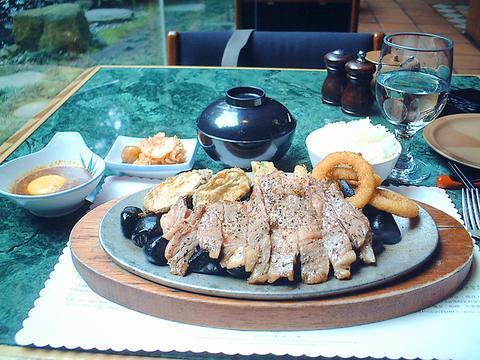Taipei's Ambassador Hotel actually has a pair of exceptional restaurants; one upstairs specializing in Sichuan cuisine and another on its lobby level with an Aboriginal theme called the Ahmi Cafe.
They're both exceptional restaurants in one way or another, something you might expect from a hotel with an international reputation, but recently they have both been made slightly more exceptional by offering home delivery for patrons too afraid of catching SARS to leave the house.

PHOTO: DAVID MOMPHARD, TAIPEI TIMES
Home delivery is something many local restaurants are trying to offer,since their dining halls are nearly empty, but not many establishments have the manpower of a major hotel to be able to offer it.
The Ambassador initially planned a home delivery trial period from May 10 to the end of this month, with the possibility of continuing it past then, but management claim that the service has not been popular with patrons and so are not continuing it. Another reason might be the NT$3,600 price tag.
For that amount you receive a six-course set meal that feeds four to five people, delivered to your doorstep presumably by a bellhop who lately hasn't had many bags to tote. And, no, there's no 30-minute guarantee.
But the loss of home delivery could well be considered a good thing. After all, the two main reasons we go out to eat are for good food in a good atmosphere. Good food can be delivered to your door, good atmosphere cannot; and atmosphere is something the Ambassador's Ahmi Cafe has plenty of.
As you walk in the front entrance, the first thing you notice of the cafe's interior decor is its exterior. A long glass wall opposite the entrance looks out onto a terrarium with a carp pond and waterfall cascading from two stories above. There is no access to the area, but sitting alongside the glass wall more than fulfills the restaurant's required amount of atmosphere.
As to the food's presentation, the Ju-Ju steak is a prime rib cut of meat served on a bed of rocks (yes, rocks). A hotplate is first topped with several dozen small black stones and the steak is set on top. The whole thing is broiled together and batter-fried slices of aubergine and asparagus are added afterward. It's as much a conversation piece as it is a meal.
In lieu of having your meal brought to your home, the Ambassador has begun offering lunchboxes in the afternoon and early evening and it's quite a site to behold. Hotel staffers dressed in black coats and white gloves stand on the sidewalk of Chungshan North Road. Two varieties of lunchboxes are displayed on sterling silver under glass and the boxes themselves are wrapped in purple with a pink ribbon.
At NT$100 for the pork and NT$120 for the fish they're twice the price of a regular lunchbox, but much less than the home-delivery option.

In the March 9 edition of the Taipei Times a piece by Ninon Godefroy ran with the headine “The quiet, gentle rhythm of Taiwan.” It started with the line “Taiwan is a small, humble place. There is no Eiffel Tower, no pyramids — no singular attraction that draws the world’s attention.” I laughed out loud at that. This was out of no disrespect for the author or the piece, which made some interesting analogies and good points about how both Din Tai Fung’s and Taiwan Semiconductor Manufacturing Co’s (TSMC, 台積電) meticulous attention to detail and quality are not quite up to

April 28 to May 4 During the Japanese colonial era, a city’s “first” high school typically served Japanese students, while Taiwanese attended the “second” high school. Only in Taichung was this reversed. That’s because when Taichung First High School opened its doors on May 1, 1915 to serve Taiwanese students who were previously barred from secondary education, it was the only high school in town. Former principal Hideo Azukisawa threatened to quit when the government in 1922 attempted to transfer the “first” designation to a new local high school for Japanese students, leading to this unusual situation. Prior to the Taichung First

Chinese Nationalist Party (KMT) Chairman Eric Chu (朱立倫) hatched a bold plan to charge forward and seize the initiative when he held a protest in front of the Taipei City Prosecutors’ Office. Though risky, because illegal, its success would help tackle at least six problems facing both himself and the KMT. What he did not see coming was Taipei Mayor Chiang Wan-an (將萬安) tripping him up out of the gate. In spite of Chu being the most consequential and successful KMT chairman since the early 2010s — arguably saving the party from financial ruin and restoring its electoral viability —

The Ministry of Education last month proposed a nationwide ban on mobile devices in schools, aiming to curb concerns over student phone addiction. Under the revised regulation, which will take effect in August, teachers and schools will be required to collect mobile devices — including phones, laptops and wearables devices — for safekeeping during school hours, unless they are being used for educational purposes. For Chang Fong-ching (張鳳琴), the ban will have a positive impact. “It’s a good move,” says the professor in the department of